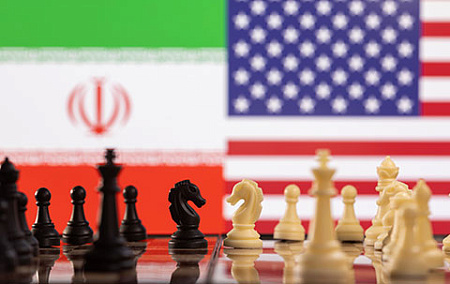
The members of the UN Security Council have convened a closed meeting on the Iranian nuclear program on March 12. The reason was the data from the International Atomic Energy Agency (IAEA) that in a few months Iran has almost halved its reserves of uranium enriched to a level close to weapons-grade. The administration of US President Donald Trump recently sent a proposal to Tehran to conclude a new deal to limit its nuclear program, while continuing to threaten severe sanctions pressure.
The UN Security Council meeting was convened on Wednesday at the request of the United States, Britain, France and several other states. The impetus for discussions on the nuclear program was given by the recent findings of the IAEA, according to which Iran’s stocks of 60% enriched uranium increased from 182 to 275 kg in just a few months. These are extraordinarily high figures for a state that publicly declares the peaceful nature of its atom. Experts say that a leap from the level of enrichment of nuclear material at 60% to the level of 90% required to obtain weapons of mass destruction can be made in a matter of weeks. In addition, the IAEA found that Iran has increased its capacity by installing new state-of-the-art centrifuges at nuclear facilities.
Iranian Foreign Minister Abbas Araghchi criticized the initiative to convene UN Security Council consultations on the nuclear program. “Holding a closed meeting at the request of some countries is a new and strange practice,” said the chief of Iranian diplomacy. “This meeting calls into question the goodwill of the states that demanded its holding.” Probably, the minister’s reproach is primarily addressed to European countries, which until recently tried to reach an agreement with the Islamic Republic on a new format of cooperation on nuclear issues. According to Araghchi, Tehran hopes that the Security Council “will fulfill its main task – maintaining peace and security” and will not succumb to external influence.
Recently, Trump informed that he had sent a message to Grand Ayatollah Ali Khamenei, in whose hands the decision-making mechanism in Iran is concentrated. This is a proposal to agree on limiting Iran’s nuclear program. The head of the White House reiterated once again that Tehran “should not get nuclear weapons,” but Washington, in his words, “would prefer to make a deal.” Trump did not say anything about its parameters. The US president simply added: “I said: I hope that you will go to negotiations, because it will be much better for Iran. I think they (the Iranians. – “NG”) want to receive this letter.”
If Tehran refuses to engage in dialogue, the US administration will take action, Trump promised, probably referring to the scenario of attacks on Iran’s nuclear infrastructure. In recent months, Israel has been actively seeking permission from the United States to conduct a large-scale operation to destroy deep and well-fortified facilities.
Publicly, the United States makes it clear that for now they will persuade Iran to negotiate through economic pressure measures. The head of the US Treasury, Scott Bessent, said last week that bankrupt Tehran is what Washington’s “updated sanctions policy” should be marked by. According to him, the American side will deprive the Islamic Republic of economic security by zeroing out its oil sector, cutting off its access to the international financial system, and depriving its defense industry of the necessary capacities.
These weeks, sources told Reuters, the White House is considering scenarios involving the seizure of Iranian oil tankers in order to discourage foreign purchasers of Iranian oil from doing business with it. According to the agency, the United States may authorize large–scale inspections of such vessels passing through key maritime arteries, even those that do not belong to the Middle East region. Such actions in the short term, according to estimates by Reuters, could reduce Iranian oil exports by about 750,000 barrels. per day. But the effectiveness of such sanctions may decrease over time, agency sources say.
“When Trump was president last time, Iranian oil exports dropped to a minimum,” U.S. Energy Secretary Chris Wright pointed out the other day. “Biden did not lift the sanctions, but stopped abiding by them, which only enriched Iran.”
However, now Tehran, by all indications, has completely abandoned the idea of resuming the negotiation process with the United States. Indirect consultations were conducted during the era of former President Joseph Biden, but then they were frozen. “It is unacceptable for us that they (Americans. – “NG”) gave orders and threatened. I won’t even negotiate with you. Do whatever you want,” said Iranian President Masoud Peseshkian recently, who once had the image of a “moderate” politician willing to make deals with Western countries.
In turn, a member of the Iranian parliament’s committee on national security and foreign policy, Fada Hossein Maleki, noted that it is necessary to create an appropriate atmosphere for dialogue with Washington. “If Trump really believes in negotiations, the first step in this direction should be the complete lifting of harsh sanctions, and after that negotiations should continue taking into account national interests,” the lawmaker explained. “According to the Supreme leader’s decision, we will sit down at the negotiating table only when we know that our national interests are protected.”
In the meantime, Tehran is betting on negotiations on the nuclear dossier in alternative formats. According to the Chinese Foreign Ministry, China will host a trilateral meeting with China, Russia and Iran this week. It is possible that Trump’s diplomatic initiative will be put up for discussion, which, as stated by the Russian official, contains not only “nuclear” but also political issues.
